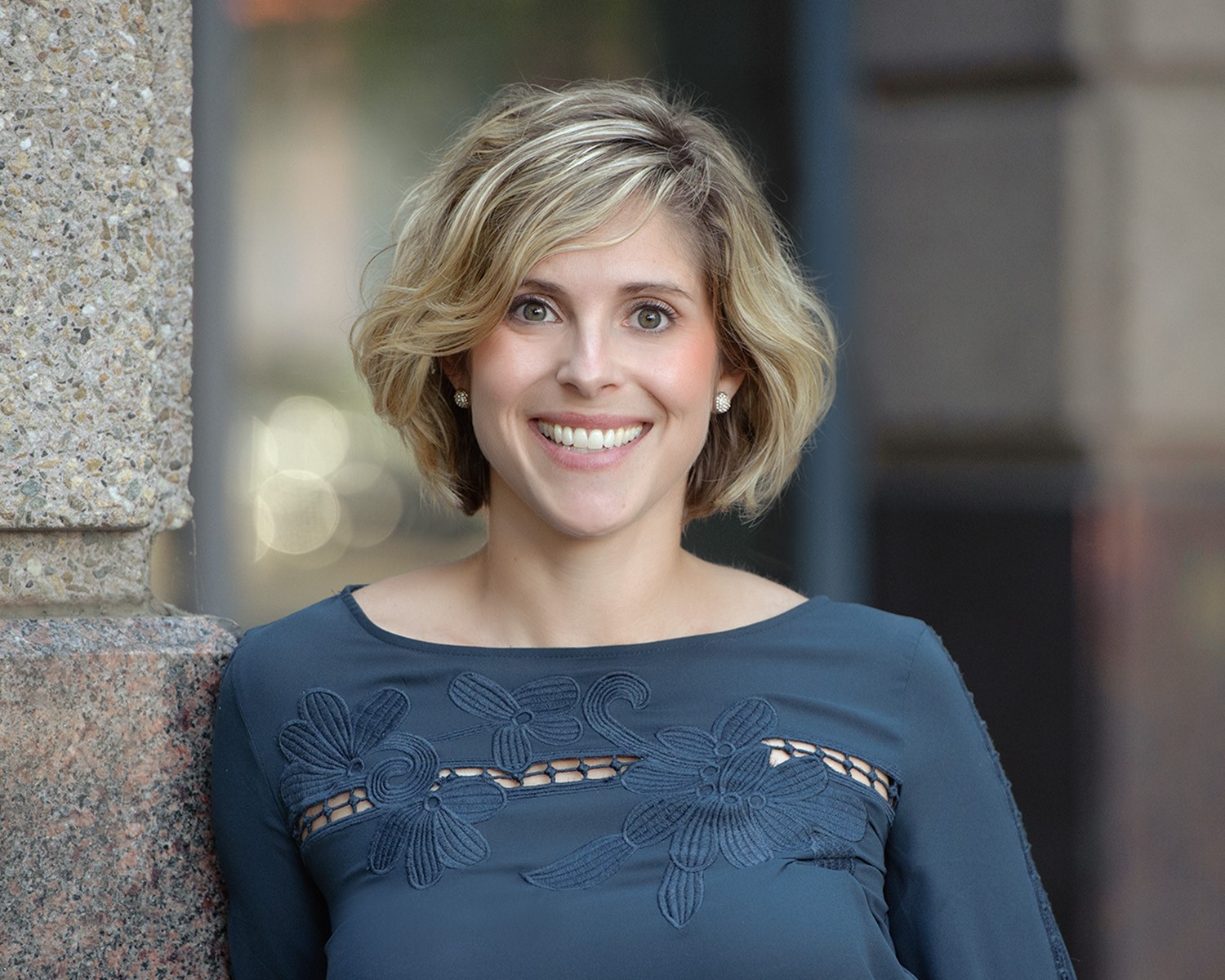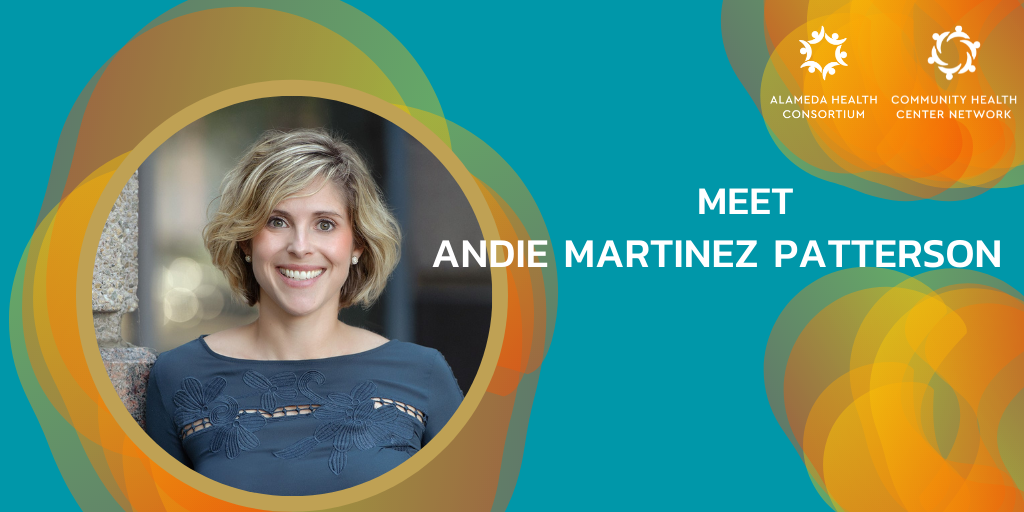Meet Andie Martinez Patterson
Andie Martinez Patterson, MPP will be joining the Alameda Health Consortium (AHC) and Community Health Center Network (CHCN) teams as our new CEO in July 2022. Andie will help guide both organizations and our member community health centers with our missions to continue expanding access to affordable care for underserved communities in the East Bay.

Name: Andie Martinez Patterson
Title: Incoming CEO, AHC/CHCN
Previously: Senior Vice President for Strategy, Integration, and System Impact, California Primary Care Association, (CPCA)
Guiding quote/tagline: Community health centers are a vehicle for radical life-empowering change. Partnering together, we will make the world a better place.
Tell us a little bit about yourself.
I am the eldest daughter of three girls, born to Pedro Martinez and Mary Cooper. My father is a Mexican immigrant, now retired but was an industrial engineer. My mother is a visual artist, teacher, and mental health guidance counselor, also retired. Before living in Sacramento, I had moved close to 15 times from New York to Mexico City to Anchorage. We moved a lot due to my parents’ international marriage, and my father’s job. Before committing myself to public policy, I was planning on being a poet and a photographer, always with the intention of making the world a better place. I met my husband Chris at CPCA in 2008 and we have been together now for almost 14 years. We have two kids- Lucia is 9 years old and in 4th grade, and Sebastian is 6 years old and in kindergarten. My husband and children are my nucleus.
You have a lot of experience in the public health realm; tell us a little bit about your work prior to coming to AHC/CHCN.
I was fortunate to find community health centers (CHCs) right out of graduate school. I started as the Migrant Coordinator at CPCA in January 2008. I didn’t know about CHCs before then, but within days I was enamored with the mission and the policy construct. Issues like migrant and homeless health pulled at my heartstrings and I was intellectually captivated by the complexities of health care like health information technology and payment transformation. I have worked on nearly all policy issues at the state level that impacts community health centers and care delivery from behavioral health, to the workforce, to immigration policy. During the COVID-19 pandemic, I was integrally involved from the start, securing authority for flexibility and payment on telehealth, grant payments to FQHCs to serve as testing sites and vaccination centers, and the vaccine-only payments which health centers are just now able to bill for.
What was it about AHC/CHCN that drew you to its work?
I have always felt a deep connection to the communities of Alameda County and to the health centers that serve them. AHC/CHCN have always been incredible partners with CPCA, helping to both inform the policy solutions and then execute the advocacy on the ground. The health centers in the consortium have provided some of the most innovative ideas in the state and have held the torch of justice up countless times, calling all the rest of us to action.
Did I mention that AHC/CHCN is in the Bay Area? Easily one of the most amazing places in California and the world. It’s beautiful, it’s funky, and it’s so diverse.
Additionally, Ralph Silber has been my mentor before he even knew it. I have continually sought his counsel and relished our growing relationship over the years. Working with him has made me think more intelligently and deliberately about CPCA’s policy work. During the last few years, Ralph has been one of my closest allies, helping to inform state policy for payment reform, managed care, and of course COVID-19 response. To take over for my long-time mentor and friend is simply one of the greatest honors of my life.
Lastly, I have longstanding, deep relationships with many of the AHC/CHCN board members and their staff. Working and partnering with these professional leaders who I have long respected fills me with deep optimism and joy.
Prior to this position, you worked for a state-wide organization, how do you envision your work will differ at the county level?
It is very exciting to me that I will get to actualize the policy solutions which I have only talked about at the state level. Instead of just theorizing about what makes the most sense for care delivery or payment, I will get to use my knowledge and apply it to operations and business solutions. I am eager to roll up my sleeves with a smaller group of members to really work through the issues and implement the solutions.
Also getting the opportunity to really focus on the local Alameda County politics and policy issues and getting to know the board of supervisors and our local representatives better, is something I’m really looking forward to. At the state level, it’s always at a distance. At AHC/CHCN I will have the opportunity to form much deeper relationships.
Lastly, shifting from state to local as a regional consortium affords me the opportunity to help contribute to the advocacy/policy wins CPCA needs support on. My empathy and understanding both for local consortia and CPCA will undoubtedly grow- always a good thing!
What experiences from CPCA do you think will assist you in your new role at AHC/CHCN?
Everything! I live and breathe member dynamics and association politics. I am a problem solver who loves working with data. I use my organizing skills to help find collaborative solutions. I have led our payment reform work, which is an important opportunity for all health centers, and definitely for AHC/CHCN members. I also have longstanding relationships with Primary Care Associations, Health Center Controlled Networks, HRSA, and the National Association of Community Health Centers. I am bringing a very full suitcase of knowledge, relationships, and passion to AHC/CHCN!
Policy work, at its heart, is to influence decision-making at all levels of government, how do you approach this?
As an organizer, which means I start by understanding the problem and then getting to know all the stakeholders and their perspectives/interest. I am always looking for the commonalities to build from a solutions orientation. For me, policy work is also about working towards the common good. I believe in compromise and moving forward together. I love hearing from and bringing in differing viewpoints because that is how the most creative collective solutions can be identified.
People power is an important component of policy and advocacy, how do you empower people to become advocates?
First, being excellent at what we do – so being the best comprehensive primary care providers we can be. If CHCs deliver on their promise of quality and access, we engender trust. Once trust is built, we can begin to partner with our patients and community and educate/share power on matters that will directly affect them. We also need to create forums to hear from the patients and community on what matters the most to them. We need to be flexible and open in our response because what they identify as being important to them, might not be what we had envisioned. We must start with where our patients and community want to be, and start building at that point.
Tell us something about yourself that most people don’t know.
I love to be creative, and cooking is my day-to-day outlet for that. And because I love food and eating, I also get to enjoy the creation!
My husband and I built a home gym during COVID, and he creates very intense High-Intensity Interval Training (HIIT) workouts for us that always have dozens of burpees, deadlifts, and box jumps. I have definitely received shocked looks as neighbors see me running down the street with weights in my hands. I give my husband similar looks of shock when he tells me what the workouts are, but I’m better for it so I just complain and do it.
Fun Fact: when I lived in Alaska, I educated tourists on how to protect themselves from bears (and I don’t know anything about bears).
You can read the full press release announcement HERE.
